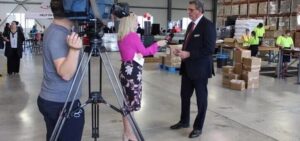 Recently I appeared live on national television. (Well, it was actually cable, but that’s national now.) Using my experience as an example, this installment of PR Fuel discusses the pros and cons of television-based public relations. Hopefully you’ll be able to take away some tips about how to get your public relations message on the air, how to prepare for that first television interview, and how to make the most of it once you’re in front of the camera.
Recently I appeared live on national television. (Well, it was actually cable, but that’s national now.) Using my experience as an example, this installment of PR Fuel discusses the pros and cons of television-based public relations. Hopefully you’ll be able to take away some tips about how to get your public relations message on the air, how to prepare for that first television interview, and how to make the most of it once you’re in front of the camera.
I appeared on Kudlow & Cramer, a show that used to air on financial news network CNBC. Co-host Larry Kudlow is a former Reagan administration economic official, Wall Street economist, and a nationally syndicated columnist who often appears on the McLaughlin Group. Co-host Jim Cramer is a former hedge fund manager who co-founded online financial news outlet TheStreet.com. Both get excited rather easily, Cramer more so.
The show was very well-respected, with a strong audience of business types and investors. Corporate executives, Wall Street analysts, journalists, and other “experts” were often on the show, which concentrated mainly on business, but also covered politics and the media.
Getting on the show was rather simple. I’d written about Cramer’s company, corresponded with him, and watched his show regularly. One of the show’s then-recent subjects had been voice-over-internet-protocol (VoIP)–basically using your high-speed internet or cable connection to make phone calls. I’d written about it extensively in the New York Post, emailing Cramer a recent column that touched on the subject. “Ping me if you ever want to discuss this,” I told him. Cramer’s response was a quick email back, cc’ing the show’s producer.
Despite my previous contact with Cramer, there was no guarantee he’d respond. Obviously what I wrote impressed him enough to ask me to come on the show. This was important because I probably could have written about the same topic in an email (rather than emailing him my article) and gotten the same response. You must show that you have a grasp of a topic and express your ideas in an articulate and exciting way. (Both crucial qualities for television.) Some news programs cover the same topics on a daily basis and provide ample opportunity for new guests. Getting an invite for an on-air interview is all about paying attention to what a show is looking for in its guests and explaining what you can offer its audience.
I exchanged some emails with the show’s producer and we cemented the day of my appearance. The producer asked if I wanted to go to the CNBC studios in New Jersey or do it remote from Manhattan. Considering there was eight inches of fresh snow on the ground, Manhattan seemed best.
One of the best things you can do to prepare for a television interview is hit the producer with a list of appropriate questions: How long will you be on? What exactly will you be discussing with the host(s)? How in-depth will the discussion get? Do you need to know numbers (financial figures, data, etc.)? What colors should you wear? What should you wear? Do they have a make-up artist there? A bathroom or mirror?
The producer asked me to forward some of my articles on VoIP for Kudlow to check out; I said I’d include some bullet/talking points as well. I ended up sending over too much info, but there’s nothing wrong with that. If they’re going to use your info as some of the basis for his questions, why not give them the ammunition you want?
It never hurts to brush up, no matter how familiar you are with your subject. I re-read my own articles on VoIP and did some additional research. Since it was a financial news show, I wanted to be able to talk about specific companies. I called a few, collecting some good background info and even a few little pieces of news to talk about. As you can guess, the public relations departments were more than happy to help once I told them I’d be mentioning their companies during my television interview. And being a public relations flack myself, I emailed a bunch of my fellow PR reps to let them know when I’d be appearing.
This is your pre-show plan: Get all the background info you need on the show and the topic. Prepare a list of questions for the producer to avoid any confusion both before and during your interview.
Once your television interview is underway, the important thing to remember is listen carefully to the questions. You don’t want to get facts, names, or ideas wrong, or simply regurgitate the host’s talking points. Use your own work as reference. Try to keep from saying “um” if possible. Stay on topic and let the hosts do their job. And end your statements naturally; a good conversation, whether in real life or the higher-stakes atmosphere of a television interview, means your words should never be left “hanging” awkwardly in the air.
This article, written by Ben Silverman, originally appeared in PR Fuel (https://www.ereleases.com/prfuel), a free weekly newsletter from eReleases (https://www.ereleases.com), the online leader in affordable press release distribution. To subscribe to PR Fuel, visit: https://www.ereleases.com/prfuel/subscribe/.
